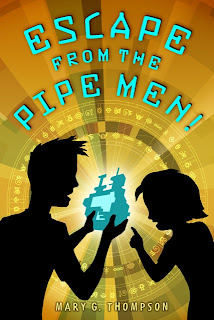Today
it’s my pleasure to interview fellow Enchanted Inkpot member, Mary G. Thompson,
about her fabulous, fantastical, novel, ESCAPE FROM THE PIPE MEN!, which is
available now!
Here’s
a brief description from Amazon:
Thirteen-year-old Ryan Hawthorn has spent his life on display as a human
exhibit in the multi-eyed Pipe Men’s intergalactic zoo. When his father is
accidentally poisoned, it’s up to Ryan and his seven-year-old sister, Becky, to
scour the universe for the antidote. Along the way, they encounter many strange
creatures—from the doglike Hottini to the spindly-legged, hairy Xaxor—and learn
that the Pipe Men (or, as Becky calls them, “overgrown drainpipes”) are not
kindly overlords, as they had been led to believe. It's not only the humans who
are planning to rebel! A wildly imaginative middle grade space-travel adventure.
Mary G. Thompson
I
loved your unique concept, of having humans in alien zoos, traveling to and
from their “cages” through portals. Can you tell me a little about where the
concept came from?
I always wanted to do
something about an alien zoo. The original kernel of an idea was that these
kids lived in a house on Earth, but they hardly ever left their house, so
everyone thought they were these very religious home-schooled kids. But in
reality, they were spending most of their time in the zoo living with aliens.
So after that I had to create the aliens who ran the zoo, and the Pipe Men
popped into my mind pretty much whole.
You
did a significant amount of world building – since you had to create different
species, planets and aircraft, and all were so distinctive and memorable. What
was your world building process?
I made a conscious
effort to make each alien species unique but still somewhat recognizable. Well,
the Pipe Men aren’t that recognizable! Part of the point is that you can get
used to anything if you live with it day in and day out. But Ip the Horn-Puff
is a big galoot; the Xaxor is buglike; the Hottini look like big blue dogs. All
the aliens have their own TV shows. Aside from the aliens, the big
world-element is the portals. I started with the passage with the doors and
then created the calculator and figured out what it could do. Once I figured
that out, it became clear why everyone would want it, and the motivations of
the different species fell into place.
I
loved how you seamlessly wove the seeds of revolution into your story, and
nothing was how it seemed. How did you keep track of it all?!
Many drafts! To me it
actually does not seem that complicated. I had a few species that all basically
wanted the same thing in their own way—freedom. For some people that meant
getting out of the zoo, and for others it meant taking over from the Pipe Men.
But all Ryan and Becky want is to save their dad and be reunited as a family,
so that simple concern kept the story grounded.
I
had so many favorite characters. Becky was so funny, smart and dead on right all
the time, and I loved Front and Ip.
Which is your favorite character, and why?
How can I choose?! Of
course I love Becky because she is smarter than her big brother and is probably
going to rule the universe some day. My favorite alien is the Xaxor because he
has complex motivations. He’s out for his species like everyone else, but at
the same time he understands friendship. He’s actually the most individual to
me even though he technically doesn’t have a name!
If
you had to visit one of the planets from the book, which one would you choose?
The kids don’t actually
go there in the book, but I’d like to visit Ip’s planet, Hdkowl. Even though
the Pipe Men have ruined the environment, I imagine the Horn-Puffs would be a
lot of fun. I think they probably like to sing and dance.
I
was struck, when I finished the book, by how all the “froms” were so distinct
in appearance and personality and yet most all wanted the same things. The
issues of bigotry and racism are powerful and thought provoking in the
book. Are you planning a sequel?
Everyone petition
Houghton Mifflin Harcourt! I would love to do a book starring Becky that begins
five years later. Ok, let’s be real. I would love to make it a trilogy!
What
are you working on now? (if you feel comfortable sharing that)
My next book is a fun, humorous
middle grade called Evil Fairies Love Hair. It’s about a town full of ravenous,
hair eating fairies. If you grow one hundred fairies, you get a wish. But you
can’t let them near your own hair, and you have to follow all the rules. Be
careful—there’s a reason everyone calls them evil fairies. Look for it next spring!
That sounds fabulous, Mary! I look forward to reading it!
Interview conducted by Erin Cashman, author of THE EXCEPTIONALS.






